形容词和副词经典讲解共41页
- 格式:ppt
- 大小:3.05 MB
- 文档页数:21


形容词与副词讲解导语:语文学习中,形容词和副词是我们常常接触到的词类。
它们在句子中起到修饰名词、动词或其他形容词、副词的作用。
本节课我们将详细讲解形容词和副词的基本概念、用法和注意事项,帮助同学们更好地理解和运用这两个词类。
一、形容词的基本概念和用法1. 形容词的定义:形容词是用来修饰名词或代词的词类,可以描述事物的性质、特征或状态。
2. 形容词的作用:形容词可以用来修饰名词,使句子更加生动、形象。
3. 形容词的用法:(1)形容词可以直接修饰名词,放在名词前面,如:美丽的花朵、高大的建筑。
(2)形容词也可以通过“是”字结构来修饰名词,如:这个房子是新的、那只猫是黑色的。
4. 形容词的变形:形容词有原级、比较级和最高级三种形式:(1)原级:形容词的原始形式,表示事物的一般特征,如:高、大、美丽。
(2)比较级:用于比较两个事物的特征,表示其中一个事物在某一方面的程度更高或更低,如:更高、更大、更美丽。
(3)最高级:用于比较三个或三个以上事物的特征,表示其中一个事物在某一方面的程度最高或最低,如:最高、最大、最美丽。
二、副词的基本概念和用法1. 副词的定义:副词是用来修饰动词、形容词、其他副词或整个句子的词类,可以表示时间、地点、方式、程度等概念。
2. 副词的作用:副词可以使句子更加丰富、准确,增加句子的表达力。
3. 副词的用法:(1)副词可以修饰动词,表示动作的方式、程度等,如:慢慢地走、非常努力地学习。
(2)副词可以修饰形容词,表示形容词的程度,如:非常漂亮、很高兴。
(3)副词可以修饰其他副词,表示副词的程度,如:非常快速地跑、很认真地听。
(4)副词可以修饰整个句子,表示整个句子的态度、语气等,如:幸运地,我们赢得了比赛。
4. 副词的变形:副词有原级、比较级和最高级三种形式,变形规则和形容词相似。
三、形容词和副词的注意事项1. 形容词和副词的区别:形容词主要修饰名词,副词主要修饰动词、形容词或其他副词。
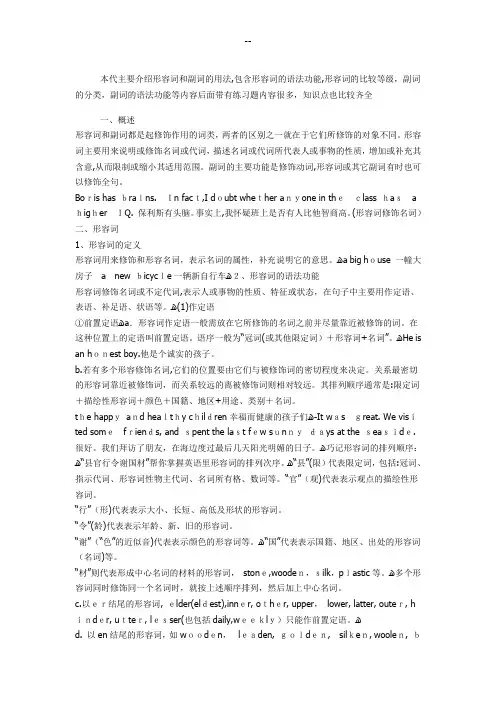
本代主要介绍形容词和副词的用法,包含形容词的语法功能,形容词的比较等级,副词的分类,副词的语法功能等内容后面带有练习题内容很多,知识点也比较齐全一、概述形容词和副词都是起修饰作用的词类,两者的区别之一就在于它们所修饰的对象不同。
形容词主要用来说明或修饰名词或代词,描述名词或代词所代表人或事物的性质,增加或补充其含意,从而限制或缩小其适用范围。
副词的主要功能是修饰动词,形容词或其它副词有时也可以修饰全句。
Boris has brains.In fact,I doubt whether anyone in theclass hasa higherIQ. 保利斯有头脑。
事实上,我怀疑班上是否有人比他智商高。
(形容词修饰名词)二、形容词1、形容词的定义形容词用来修饰和形容名词,表示名词的属性,补充说明它的意思。
ﻫa big house 一幢大房子a new bicycle一辆新自行车ﻫ2、形容词的语法功能形容词修饰名词或不定代词,表示人或事物的性质、特征或状态,在句子中主要用作定语、表语、补足语、状语等。
ﻫ(1)作定语①前置定语ﻫa.形容词作定语一般需放在它所修饰的名词之前并尽量靠近被修饰的词。
在这种位置上的定语叫前置定语。
语序一般为“冠词(或其他限定词)+形容词+名词”。
ﻫHe is an honest boy.他是个诚实的孩子。
b.若有多个形容修饰名词,它们的位置要由它们与被修饰词的密切程度来决定。
关系最密切的形容词靠近被修饰词,而关系较远的离被修饰词则相对较远。
其排列顺序通常是:限定词+描绘性形容词+颜色+国籍、地区+用途、类别+名词。
the happyand healthy children幸福而健康的孩子们ﻫ-It wasgreat. We visited somefriends, and spent the last few sunnydays at the seaside. 很好。
我们拜访了朋友,在海边度过最后几天阳光明媚的日子。
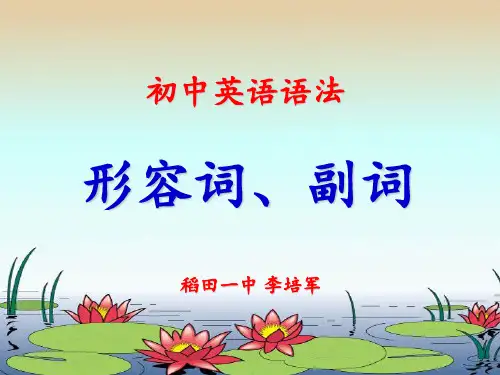
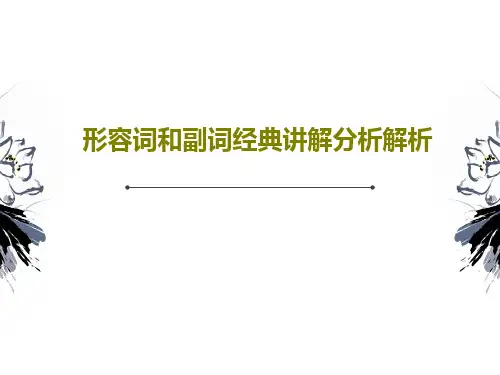
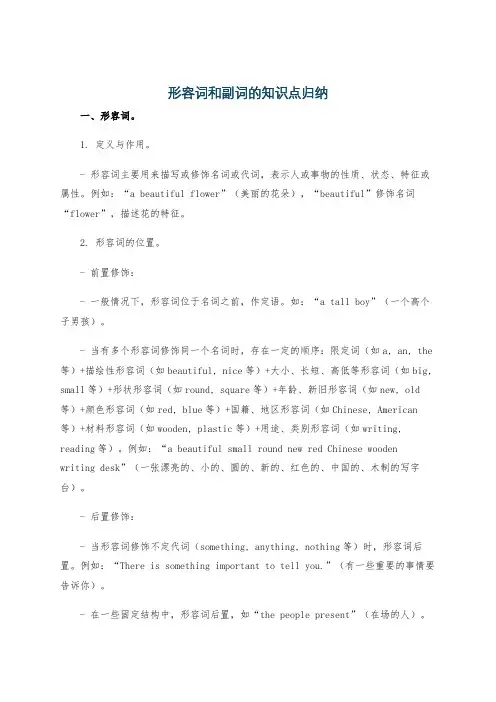
形容词和副词的知识点归纳一、形容词。
1. 定义与作用。
- 形容词主要用来描写或修饰名词或代词,表示人或事物的性质、状态、特征或属性。
例如:“a beautiful flower”(美丽的花朵),“beautiful”修饰名词“flower”,描述花的特征。
2. 形容词的位置。
- 前置修饰:- 一般情况下,形容词位于名词之前,作定语。
如:“a tall boy”(一个高个子男孩)。
- 当有多个形容词修饰同一个名词时,存在一定的顺序:限定词(如a, an, the 等)+描绘性形容词(如beautiful, nice等)+大小、长短、高低等形容词(如big, small等)+形状形容词(如round, square等)+年龄、新旧形容词(如new, old 等)+颜色形容词(如red, blue等)+国籍、地区形容词(如Chinese, American 等)+材料形容词(如wooden, plastic等)+用途、类别形容词(如writing, reading等)。
例如:“a beautiful small round new red Chinese woodenwriting desk”(一张漂亮的、小的、圆的、新的、红色的、中国的、木制的写字台)。
- 后置修饰:- 当形容词修饰不定代词(something, anything, nothing等)时,形容词后置。
例如:“There is something important to tell you.”(有一些重要的事情要告诉你)。
- 在一些固定结构中,形容词后置,如“the people present”(在场的人)。
3. 形容词的比较级和最高级。
- 规则变化:- 一般在词尾加 -er(比较级)和 -est(最高级)。
如:tall - taller - tallest。
- 以不发音的e结尾的单词,加 -r和 -st。
如:nice - nicer - nicest。
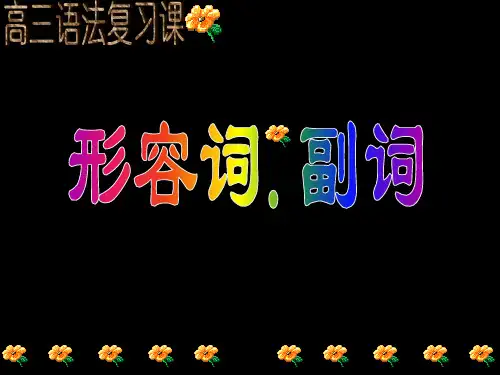
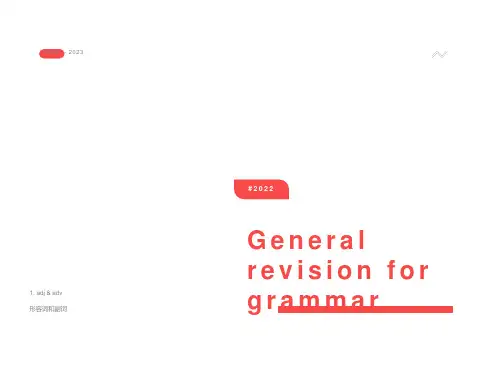
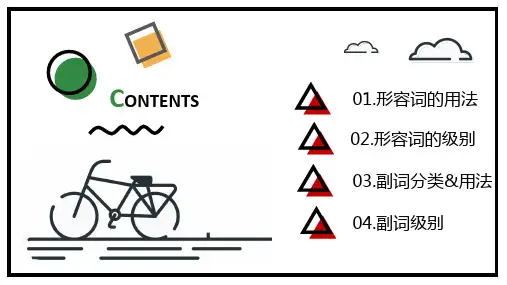
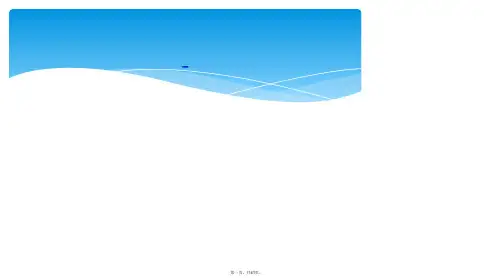
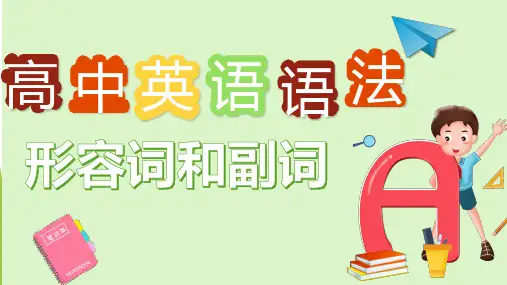
形容词副词定义:中文的意思是“……的”的词是形容词,用来修饰名词;中文意思是“……地”的词是副词,用来修饰动词、形容词或副词形容词与副词在句中的位置形容词形容词的比较级在句中的位置名词所有格副词的比较级形容词副词的转换考点清单练习:练习① It is a ____(sun) day. ② It is a _____(rain) day.③ I think you are a _____(luck) girl. ④ The teacher said he had _____to tell us.A. anything importantB. important anythingC. something importantD. important something⑤ Look !Jack is ____(excite,excited) . ⑥ I feel ____(happy) every day.⑦ The baby is sleeping ,please keep______(quiet,quietly)考点二:形容词的比较级1.规则的形容词比较级(1)在形容词词尾加上“er”“est”构成比较级、最高级:bright(明亮的)—brighter—brightest broad(广阔的)—broader—broadest cheap(便宜的)—cheaper—cheapest clean(干净的)—cleaner—cleanest clever(聪明的)—cleverer—cleverest cold(寒冷的)—colder—coldestcool(凉的)—cooler—coolest dark(黑暗的)—darker—darkest dear(贵的)—dearer—dearest deep(深的)—deeper—deepestfast(迅速的)—faster—fastest few(少的)—fewer—fewestgreat(伟大的)—greater—greatest hard(困难的,硬的)—harder—hardest high(高的)—higher—highest kind(善良的)—kinder—kindestlight(轻的)—lighter—lightest long(长的)—longer—longestloud(响亮的)—louder—loudest low(低的)—lower—lowestnear(近的)—nearer—nearest new(新的)—newer—newestpoor(穷的)—poorer—poorest quick(快的)—quicker—quickest quiet(安静的)—quieter—quietest rich(富裕的)—richer—richestshort(短的)—shorter—shortest slow(慢的)—slower—slowestsmall(小的)—smaller—smallest smart(聪明的)—smarter—smartest soft(柔软的)—softer—softest strong(强壮的)—stronger—strongest sweet(甜的)—sweeter—sweetest tall(高的)-taller-tallestthick(厚的)—thicker—thickest warm(温暖的)—warmer—warmest weak(弱的)—weaker—weakest young(年轻的)—younger—youngest (2).双写最后一个字母,再加上“er”“est”构成比较级、最高级:big(大的)—bigger—biggest fat(胖的)—fatter—fattesthot(热的)—hotter—hottest red(红的)—redder—reddestsad(伤心的)—sadder—saddest thin(瘦的)—thinner—thinnestwet(湿的)—wetter—wettest mad(疯的)—madder—maddest(3).以不发音的字母e结尾的形容词,加上“r”“st”构成比较级、最高级:able(能干的)—abler—ablest brave(勇敢的)—braver—bravest close(接近的)—closer—closest fine(好的,完美的)—finer—finestlarge(巨大的)—larger—largest late(迟的)—later—latestnice(好的)—nicer—nicest ripe(成熟的)—riper—ripestrude(粗鲁的)—ruder—rudest safe(安全的)—safer—safeststrange(奇怪的)—stranger—strangest wide(宽广的)—wider—widestwise(睿智的,聪明的)—wiser—wisest white(白的)—whiter—whitest(4).以字母y结尾的形容词,把y改为i,再加上“er”“est”构成比较级、最高级:busy(忙碌的)—busier—busiest dirty(脏的)—dirtier—dirtiestdry(干燥的)—drier—driest early(早的)—earlier—earliesteasy(容易的)—easier—easiest friendly(友好的)—friendlier—friendliest funny(好玩的)—funnier—funniest happy(开心的)—happier—happiest healthy(健康的)—healthier—healthiest heavy(重的)—heavier—heaviesthungry(饿的)—hungrier—hungriest lazy(懒惰的)—lazier—laziestlucky(幸运的)—luckier—luckiest naughty(调皮的)—naughtier—naughtiest noisy(嘈杂的)—noisier—noisiest pretty(美丽的)—prettier—prettiestsilly(傻的)—sillier—silliest spicy(辣的)—spicier—spiciestthirsty(渴的)—thirstier—thirstiest ugly(丑的)—uglier—ugliest(5).双音节、多音节形容词,在单词前面加上“more”“most”构成比较级、最高级:afraid(害怕的)—more afraid—most afraidbeautiful(美丽的)—more beautiful—most beautifulcareful(仔细的)—more careful—most carefulcheerful(开心的)—more cheerful—most cheerfulcrowded(拥挤的)—more crowded—most crowdeddangerous(危险的)—more dangerous—most dangerousdelicious(美味的)—more delicious—most deliciousdifficult(困难的)—more difficult—most difficultexciting(令人兴奋的)—more exciting—most excitingexpensive(昂贵的)—more expensive—most expensivefamous(著名的)—more famous—most famousfrightened(受惊的)—more frightened—most frightenedfrightening(令人害怕的)—more frightening—most frighteninghard-working(勤奋的)—more hard-working—most hard-workinghelpful(有帮助的)—more helpful—most helpfulhonest(诚实的)—more honest—most honestimportant(重要的)—more important—most importantinteresting(有趣的)—more interesting—most interestingpolite(有礼貌的)—more polite—most politeterrible(可怕的)—more terrible—most terribletired(累的)—more tired—most tired(6).不规则变化的形容词:bad(坏的)—worse—worst far(远的)—farther—farthest (far—further—furthest)good(好的)—better—best ill(病的)—worse—worstlittle(少的)—less—least many(多的)—more—most much(多的)—more—most old(年老的)—older—oldest ( old—elder—eldest) well(好的,身体好的)—better—best练习1. Is your friend ____ (young) than you ?2. Shanghai is one of ______ (big) cities in the world.3. Do you think English is _____important than maths。